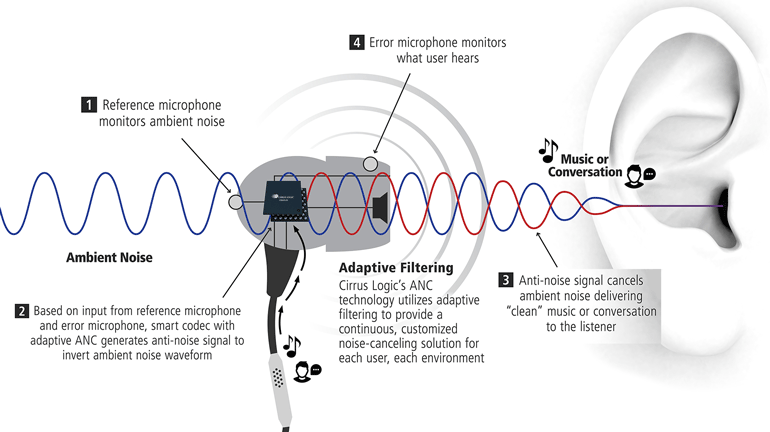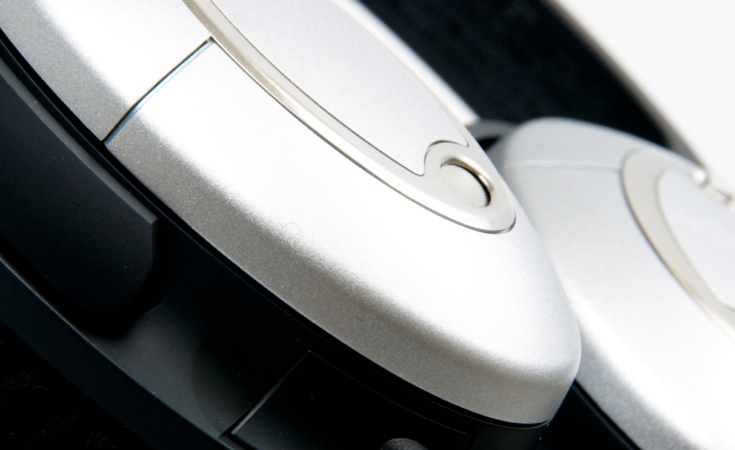Making phone calls is an easy and convenient way to reach someone. All you have to do is pick up your phone and dial the number, and you can do this from wherever. That being said, when you’re out and about, it can often be too noisy to have a proper conversation with someone. Not only can you not hear them so well, but your voice is muffled by your surrounding environment.
Fortunately, with advancing technology, this issue can be fixed. CVC noise cancellation is here to save the day, allowing you to have interrupted and noise-free, clear phone calls no matter where you are.
But what is CVC noise cancellation? How does it work? And do I need to use it? We’ve answered all your CVC related questions below, so keep reading on to find out how to have that phone call in peace.
What Is CVC Noise Cancellation?
CVC is short for “Clear Voice Capture” and uses noise suppression to identify the sound of your voice and suppress any unwanted background noises. It filters the human voice so people can hear you more clearly, perfect for phone calls in noisy environments. CVC gives the best quality phone call conversation through may different communication devices, and has also been used for podcasts and teleconferences.
How Does CVC Noise Cancellation Work?
CVC noise cancellation works by using algorithms. When you begin speaking on the phone with CVC, it starts separating what you’re saying from all the other sounds around you. It checks the reception and transmission of your voice, and creates a profile with which it uses to cancel out other external sounds. This means that it works better the longer you’re on the phone.
CVC also works for incoming sound. If the other person is in a loud or noisy location, CVC can filter out their voice and suppress any excess background noise, helping to improve sound quality.
CVC noise cancellation works in two dimensions: passive noise cancellation (ambient noise reduction) and active noise isolation. Ambient noise reduction works by blocking vibrations and external sound waves from reaching the eardrum. Passive noise canceling blocks approximately 10-20 decibels noise.
Through these methods, CVC noise cancellation can filter out up to 30 dB of external noise. This doesn’t mean it’s going to block out noise from a construction site or the honking or car horns, but it does mean that you should be able to have a much clearer and crisp conversation. And, even if there is a loud noise in the background, your voice will be the clearest noise passed down the phone.
Many headphones and earbuds that are manufactured today come with CVC technology. You should also be able to download this technology onto your smartphone through an app. Because it is a software solution, not a hardware solution, it can be used on a variety of devices, including on your laptop.

What Is CVC Noise Cancellation Good For?
No one likes an interrupted phone call. There’s nothing more frustrating than needing to make a call, but being in a loud environment where you know the person on the other end of the phone isn’t going to be able to hear you. CVC filters out the sound of your voice so only that is passed through the phone to the receiver.
As mentioned above, CVC can reduce up to 30-decibel noise from your background. This includes noises such as echoes, and sounds in the distance, meaning you can make a clear call from anywhere. Because CVC works for incoming sound, too, it also means it doesn’t matter if the person you are talking to is in a noisy area.
CVC noise cancellation is very useful for those who are hard of hearing. While speaking to someone who is not hard of hearing in a noisy environment is difficult, it can become almost impossible if the other person has their hearing impaired. CVC allows phone calls to be made loudly and clearly no matter the hearing ability of the receiver.
What Are The Main Features Of CVC Noise Cancellation?
The following are the main features of CVC noise cancellation:
- Auxiliary stream mixing
- Nonlinear processing
- Comfort noise
- Send and receive equalizers
- Howling control
- Auto gain adjustments
- Power saving mode
- Adaptive equalizers
- Frequency enhanced speech intelligibility
What Is The Difference Between CVC And ANC And How Does It CVC Compare?
CVC and ANC (Active Noise Canceling) are completely different. While CVC is designed to improve the call quality for the receiver, so they can hear your voice better, ANC alters thing for your experience.
ANC blocks out background noise, so you can listen to music or take a call without being interrupted. It can usually reduce background noise by about 20 decibels, meaning it will block out around 70 percent of background noise in most environments.
ANC is often paired with passive noise canceling in wireless earbuds and earphones, meaning it creates a noise-blocking seal in your ear canal. Passive noise canceling is not as common in over-the-ear headphones because they can’t create the same type of seal as in-ear earbuds. Because of this, ANC is more common in noise cancelling headphones than earbuds.

How ANC Works
It is difficult to say whether CVC or ANC is better, as they both work differently and have different jobs. While CVC helps the other person on a phone call hear you better, ANC allows you to be able to hear better. They’re both great at their noise control jobs, but they just have different purposes.
The one downside to ANC is that it is a hardware solution, whereas CVC is a software solution. This means that, while CVC can be installed on many different devices, ANC cannot. This is because ANC requires microphones and circuitry to work; the microphones will detect any sounds that have gotten through the passive seal and the circuitry will create a noise fingerprint in order to determine what to block out.
Therefore, if you would like your electrical product to feature ANC, you will need to make sure it comes with ANC built-in, such as specific ANC headphones. Unlike CVC, this is not something you can install onto your device later on.

What Are The Pros And Cons Of CVC?
As with any technology, there are both pros and cons to CVC. Let’s take a look at these in further detail.
Advantages of CVC
CVC is excellent noise reduction technology. One of the biggest advantages of CVC is that it can reduce background noise of up to 30 decibels, which makes conversations on the phone much easier. This is perfect for those who often have to make calls in noisy areas, or the receiver of the call has a hard time hearing the caller.
What’s more, CVC noise cancellation can also help to reduce noise coming through the phone form the receiver. While it doesn’t do as good a job as ANC technology, it can still improve call quality for both parties.
Another main benefit of CVC is its availability. Because it is a software solution, not a hardware solution, it can be used on a variety of devices, including on your laptop. You can download it and start using it immediately, with very little issue. The latest version of CVC, CVC 8.0 is compatible with the latest Bluetooth version. The pervious version, CVC 6.0 is also compatible with Bluetooth
Disadvantages of CVC
You may be thinking about buying a pair of wireless headphones with CVC technology installed. Unfortunately, there are also disadvantages to CVC noise canceling technology. The biggest disadvantage to CVC is how expensive it is. While a regular set of high-quality headphones could set you back around $100, a pair with CVC installed could cost you over $400.
Another disadvantage is the battery life of these devices. CVC noise canceling uses a lot of power to function, and therefore your device may not last as long between charges. CVC can also take a while to work properly. The longer you are on a call, the better CVC will get at recognizing your voice. Therefore, if you always make quick calls, it might not be so beneficial for you or the receiver.
Summary
CVC noise cancellation can drastically improve the sound quality during phone calls, making it easier for both you and the recipient to hear each other. With this technology you can take phone calls in loud places, and excess and background noise will be reduced by up to 30 decibels. CVC can be installed onto many different devices, including your phone and laptop, and you can also purchase special bluetooth headphone with CVC built in. Gone are the days of having to repeat yourself while on the phone — happy chatting!




